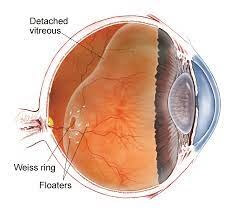What causes floaters?
Posted in Dry Eyes, Eye Blog, Eye Exam, Fluctuating Vision, Medical, Mount Vernon, Stanwood, Whidbey
By Jared Rasmussen OD
Have you ever felt like you’ve just seen a fly move out of the corner of your eye? You try to swat it away to no avail and then eventually realize there might not be a fly at all. You probably don’t have a pest problem, but rather floaters!

What exactly are floaters?
Floaters arise from the vitreous humor which is the jelly-like substance inside your eye. As a result of too many birthdays, trauma, surgery, near sightedness, and sometimes other conditions; vitreous fibers can accumulate together or the vitreous can detach from the back of the eye.
What do they look like?

When these fibers or detachment sites pass in front of our line of sight, they cast a shadow on the retina, and we perceive the shadow as an object floating in front of our eye even though it is inside it. Vitreous floaters may appear as gray cobwebs, spots, or strings that will move around in your vision with eye movements (think of your eye as a snow globe!)
They can also be accompanied by flashes of light in peripheral vision as the vitreous tugs on the retina. Vitreous floaters are very common. In recent surveys 76% of individuals over 23 years old reported having floaters. Floaters will never truly go away but the brain does a good job of adapting to them and after a few weeks they typically are only noticed with certain eye movements or on bright backgrounds or sunny days.
Treatments
Thankfully treatment of vitreous floaters is rarely needed. However, any time there is a new floater in your vision it is best to be evaluated by an eye care physician soon after they are noticed to rule out a retinal tear or detachment, which do require urgent treatment. If the floater is accompanied by flashes of light, there are several new floaters, or changes to vision; seek care right away as the risk of a retinal issue is much higher. Persistent dense floaters can be treated with laser procedures or surgery, however the effort and risk of these procedures is usually not worth the benefit.
Have a new floater or concern about an old one? Give us a call today at 360-424-2020!
Contact Cascadia Eye
If you would like to learn more, or if you would like to schedule an appointment at Cascadia Eye, please contact us today. We are happy to answer any questions you might have!
In addition, join us on Facebook, Instagram or YouTube to ask your questions about eyes, exams, and our practice. We’d love to hear from you – and there might be a blog to address your questions in the future.



